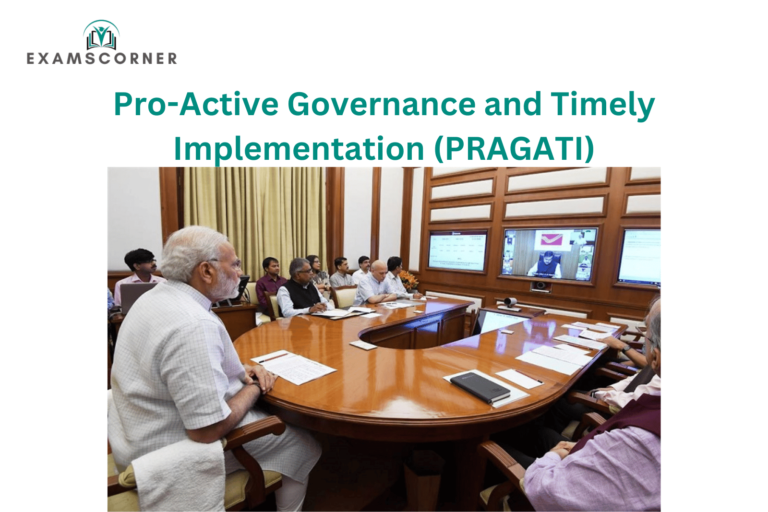PRAGATI, short for Pro-Active Governance and Timely Implementation, is an innovative Information and Communication Technology (ICT) platform that operates under the Prime Minister’s Office (PMO). This platform plays a critical role in the monitoring, reviewing, and addressing the grievances related to government projects across India. The initiative seeks to ensure that government projects are implemented efficiently and on time, improving overall governance in the country.
In this article, we’ll dive deep into the PRAGATI platform, its objectives, features, and recent updates, highlighting how it is enhancing governance and ensuring timely implementation of key projects.
What is PRAGATI?
PRAGATI is a multi-faceted ICT platform designed to address a range of governance-related challenges, including:
- Project implementation and monitoring
- Grievance redressal
- Timely execution of government schemes and programs
Launched in 2015, the platform aims to provide real-time updates and insights into the progress of various government projects. It facilitates direct interactions between the Prime Minister, Secretaries of Government of India, and Chief Secretaries of States, helping to bridge gaps in communication and decision-making processes.
Recent Update on PRAGATI:
In January 2021, the 35th edition of PRAGATI was chaired by Prime Minister Narendra Modi. During this meeting, ten agenda items were discussed, including nine projects and one programme. These projects were from various ministries, including the Ministry of Railways, Ministry of Road Transport and Highways, Department for Promotion of Industry and Internal Trade, Power Ministry, and the Ministry of External Affairs.
Objectives of PRAGATI
The PRAGATI platform is designed with a set of clear objectives aimed at improving governance and ensuring the timely execution of projects:
- Efficient Project Implementation:
PRAGATI facilitates the smooth implementation of government projects by providing real-time data and communication between all stakeholders. - Project Monitoring:
The platform enables continuous monitoring of ongoing government projects, ensuring that all tasks and objectives are achieved on schedule. - Grievance Redressal:
PRAGATI focuses on addressing the grievances of citizens, ensuring that their concerns related to government schemes are promptly addressed and resolved.
Technology Behind PRAGATI
PRAGATI combines the power of three key technologies to achieve its goals:
- Digital Data Management:
The platform uses digital tools to track the progress of projects, manage records, and ensure that data is easily accessible for review and action. - Video Conferencing:
Through video conferencing, the Prime Minister holds monthly meetings with various government officials, ensuring real-time communication and decision-making. - Geo-Spatial Technology:
The use of geo-spatial technology helps track the physical progress of government projects, offering location-based updates on the status of ongoing initiatives.
Features of PRAGATI
PRAGATI has several features that make it a unique and powerful governance tool:
Three-Tier System:
PRAGATI operates on a three-tier system, involving:
- Prime Minister (PM)
The PM chairs the monthly interactions on the platform, overseeing the progress of projects and addressing critical issues related to governance. - Secretaries of Government of India (GOI)
These are the officials responsible for implementing and monitoring various central government projects. - State Chief Secretaries
The Chief Secretaries of different states interact with the platform to provide updates on state-level initiatives and resolve local issues.
Monthly Interactions – ‘PRAGATI Day’:
The fourth Wednesday of every month is designated as ‘PRAGATI Day’, when the Prime Minister interacts with the secretaries and chief secretaries. These interactions focus on:
- Reviewing the progress of government programs
- Addressing pending projects
- Discussing public grievances received through various channels
During these interactions, the Prime Minister is presented with up-to-date information about the status of ongoing projects and grievances, displayed on-screen for a comprehensive review.
Database for Tracking Issues:
PRAGATI’s database includes a detailed record of all ongoing programs, pending projects, and public complaints. This helps prioritize issues based on urgency and significance, ensuring that no concern goes unnoticed.
Impact of PRAGATI on Governance
The PRAGATI platform plays a pivotal role in transforming the governance landscape in India:
- Enhanced Accountability:
Through real-time monitoring and regular interactions, PRAGATI ensures that government officials are held accountable for the timely execution of projects. - Improved Coordination:
By bringing together the central and state government officials on a single platform, PRAGATI improves coordination and ensures that different departments are aligned towards common goals. - Faster Resolution of Public Grievances:
With its focus on grievance redressal, PRAGATI ensures that citizen complaints are addressed promptly, improving public satisfaction. - Boost to Project Efficiency:
The continuous review of ongoing projects helps eliminate delays and roadblocks, resulting in better management and execution.
Conclusion
PRAGATI, the Pro-Active Governance and Timely Implementation platform, has emerged as a powerful tool for real-time project monitoring, grievance redressal, and enhancing accountability within government operations. Through its innovative use of ICT, the platform enables seamless communication between the Prime Minister, central government officials, and state governments, ensuring that projects are implemented efficiently and in a timely manner.
By focusing on transparency, responsiveness, and accountability, PRAGATI is playing a vital role in reshaping governance and improving the overall delivery of government services. As India continues its journey towards more proactive and efficient governance, PRAGATI will undoubtedly remain a key enabler of progress and citizen satisfaction.



